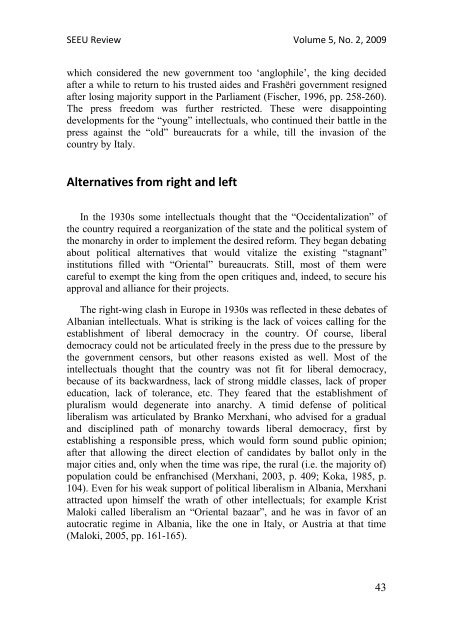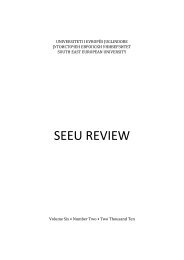SEEU Review vol. 5 Nr. 2 (pdf) - South East European University
SEEU Review vol. 5 Nr. 2 (pdf) - South East European University
SEEU Review vol. 5 Nr. 2 (pdf) - South East European University
Create successful ePaper yourself
Turn your PDF publications into a flip-book with our unique Google optimized e-Paper software.
<strong>SEEU</strong> <strong>Review</strong> Volume 5, No. 2, 2009<br />
which considered the new government too ‘anglophile’, the king decided<br />
after a while to return to his trusted aides and Frashëri government resigned<br />
after losing majority support in the Parliament (Fischer, 1996, pp. 258-260).<br />
The press freedom was further restricted. These were disappointing<br />
developments for the “young” intellectuals, who continued their battle in the<br />
press against the “old” bureaucrats for a while, till the invasion of the<br />
country by Italy.<br />
Alternatives from right and left<br />
In the 1930s some intellectuals thought that the “Occidentalization” of<br />
the country required a reorganization of the state and the political system of<br />
the monarchy in order to implement the desired reform. They began debating<br />
about political alternatives that would vitalize the existing “stagnant”<br />
institutions filled with “Oriental” bureaucrats. Still, most of them were<br />
careful to exempt the king from the open critiques and, indeed, to secure his<br />
approval and alliance for their projects.<br />
The right-wing clash in Europe in 1930s was reflected in these debates of<br />
Albanian intellectuals. What is striking is the lack of voices calling for the<br />
establishment of liberal democracy in the country. Of course, liberal<br />
democracy could not be articulated freely in the press due to the pressure by<br />
the government censors, but other reasons existed as well. Most of the<br />
intellectuals thought that the country was not fit for liberal democracy,<br />
because of its backwardness, lack of strong middle classes, lack of proper<br />
education, lack of tolerance, etc. They feared that the establishment of<br />
pluralism would degenerate into anarchy. A timid defense of political<br />
liberalism was articulated by Branko Merxhani, who advised for a gradual<br />
and disciplined path of monarchy towards liberal democracy, first by<br />
establishing a responsible press, which would form sound public opinion;<br />
after that allowing the direct election of candidates by ballot only in the<br />
major cities and, only when the time was ripe, the rural (i.e. the majority of)<br />
population could be enfranchised (Merxhani, 2003, p. 409; Koka, 1985, p.<br />
104). Even for his weak support of political liberalism in Albania, Merxhani<br />
attracted upon himself the wrath of other intellectuals; for example Krist<br />
Maloki called liberalism an “Oriental bazaar”, and he was in favor of an<br />
autocratic regime in Albania, like the one in Italy, or Austria at that time<br />
(Maloki, 2005, pp. 161-165).<br />
43

















